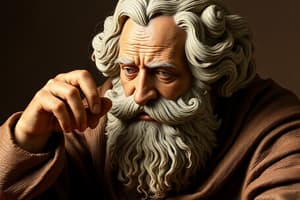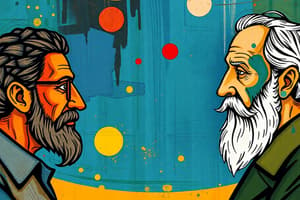Podcast
Questions and Answers
Who stated that 'man is the measure of all things'?
Who stated that 'man is the measure of all things'?
- Jacques Louis David
- Bertrand Russell
- Socrates (correct)
- Karl Marx
Voltaire believed that if evil exists, then a good, all-powerful God must be present.
Voltaire believed that if evil exists, then a good, all-powerful God must be present.
False (B)
What was one of Karl Marx's goals mentioned in the content?
What was one of Karl Marx's goals mentioned in the content?
Eliminate scarcity, classes, property, family, sexual mores, God
In the 1940s, the _____ Holocaust occurred during WW2.
In the 1940s, the _____ Holocaust occurred during WW2.
Match the following individuals with their associated philosophies or fields:
Match the following individuals with their associated philosophies or fields:
What is Plato known for emphasizing in the School of Athens?
What is Plato known for emphasizing in the School of Athens?
Aristotle believed that the physical world was less important than spiritual ideals.
Aristotle believed that the physical world was less important than spiritual ideals.
Who is considered the father of postmodernism?
Who is considered the father of postmodernism?
The concept of ______ suggests that every event is determined by preceding events and conditions.
The concept of ______ suggests that every event is determined by preceding events and conditions.
Match the thinkers with their contributions:
Match the thinkers with their contributions:
What did Leonardo da Vinci seek to unify?
What did Leonardo da Vinci seek to unify?
Rationalism posits that all truth must come from experience and observation.
Rationalism posits that all truth must come from experience and observation.
What artistic work by Rembrandt was mentioned as touching upon the relationship between God and man?
What artistic work by Rembrandt was mentioned as touching upon the relationship between God and man?
In which time period did the Renaissance occur?
In which time period did the Renaissance occur?
Jesus Christ was born in 1 AD.
Jesus Christ was born in 1 AD.
What key event did Martin Luther initiate on October 31, 1517?
What key event did Martin Luther initiate on October 31, 1517?
The phrase 'Ano Domini' means the 'Year of the ______'.
The phrase 'Ano Domini' means the 'Year of the ______'.
Match the following philosophers with their main ideas:
Match the following philosophers with their main ideas:
What does Postmodernism suggest about contradictions?
What does Postmodernism suggest about contradictions?
The death of Peter and Paul occurred in 68 AD.
The death of Peter and Paul occurred in 68 AD.
What is the philosophical term used that suggests 'I am the measure'?
What is the philosophical term used that suggests 'I am the measure'?
Which of the following artists is known for their contribution to Cubism?
Which of the following artists is known for their contribution to Cubism?
Dadaism is known for its emphasis on rational thought and order.
Dadaism is known for its emphasis on rational thought and order.
What term describes the idea that opposite ideas cannot both be true at the same time?
What term describes the idea that opposite ideas cannot both be true at the same time?
__________ is a movement characterized by its focus on dream-like scenes and illogical realities.
__________ is a movement characterized by its focus on dream-like scenes and illogical realities.
Match the following art movements with their characteristics:
Match the following art movements with their characteristics:
Who is considered the father of modern public education?
Who is considered the father of modern public education?
According to Aristotle's Laws of Identity, 'A does not equal A' is a true statement.
According to Aristotle's Laws of Identity, 'A does not equal A' is a true statement.
The artwork 'Persistence of Memory' is associated with the artist __________.
The artwork 'Persistence of Memory' is associated with the artist __________.
Flashcards
A.D.
A.D.
The year of the Lord, marking the traditional year of Jesus Christ's birth.
Classical Times
Classical Times
The period from 500 BC to 500 AD, characterized by the rise of the Greek and Roman Empires, leading to the development of classical culture and philosophy.
Constancy and Change
Constancy and Change
The belief that all things are constantly changing, emphasizing the flux and flow of reality. This concept is attributed to Greek philosopher Heraclitus.
Homo Mensura
Homo Mensura
Signup and view all the flashcards
Postmodernism
Postmodernism
Signup and view all the flashcards
Socratic Method
Socratic Method
Signup and view all the flashcards
Medieval Times
Medieval Times
Signup and view all the flashcards
Renaissance
Renaissance
Signup and view all the flashcards
Humanism
Humanism
Signup and view all the flashcards
Existentialism
Existentialism
Signup and view all the flashcards
Nihilism
Nihilism
Signup and view all the flashcards
Deism
Deism
Signup and view all the flashcards
Leap of Faith
Leap of Faith
Signup and view all the flashcards
Determinism
Determinism
Signup and view all the flashcards
Rationalism
Rationalism
Signup and view all the flashcards
Radical Dualism (Descartes)
Radical Dualism (Descartes)
Signup and view all the flashcards
Empiricism (John Locke)
Empiricism (John Locke)
Signup and view all the flashcards
Truth is Fiction (Postmodernism)
Truth is Fiction (Postmodernism)
Signup and view all the flashcards
Art and the Reformation
Art and the Reformation
Signup and view all the flashcards
Two Books: God's Words & God's Works
Two Books: God's Words & God's Works
Signup and view all the flashcards
Dadaism
Dadaism
Signup and view all the flashcards
Deconstruction
Deconstruction
Signup and view all the flashcards
Abstract Art
Abstract Art
Signup and view all the flashcards
Surrealism
Surrealism
Signup and view all the flashcards
Law of Non-Contradiction
Law of Non-Contradiction
Signup and view all the flashcards
Study Notes
Apologetics Overview
- Key dates and periods of history are included, spanning from ancient times to the modern era.
- Apologetics: the study and defense of religious ideas and beliefs. This particular document has focused on the historical background and significant events in different eras.
Apologetics Periods
- 500 BC to 500 AD: Classical Times, spanning Greco-Roman civilization.
- 500 AD to 1500 AD: Medieval Times.
- 1275 - 1500 AD: Early Middle Ages
- 1300 - 1500 AD: Renaissance
- 1517: Reformation.
Periods and Key Figures
- 300 BC: Greek Empire.
- 50 BC: Roman Empire.
- 6 BC - 33 AD: Jesus Christ.
- 68 AD: Death of Peter, Paul.
- 70 AD: Destruction of Jerusalem.
Philosophical Movements
-
Postmodernism: This philosophical movement challenges the idea of absolute truths and embraces pluralism, where contradictions in cultures and thought-forms are not only acknowledged but deemed acceptable. It suggests that various perspectives coexist, leading to a more complex understanding of reality that reflects the multifaceted nature of human experience.
-
Pre-Socratic Philosophers: This term refers to early Greek thinkers such as Thales, who is often credited as the first philosopher, and Heraclitus, known for his doctrine of change and the concept of Logos is a significant concept in both philosophy and rhetoric. It is derived from the Greek word for "reason" or "word" and is often associated with the principle of order and knowledge. In the context of Heraclitus, logos refers to the underlying reason or principle that governs the cosmos, suggesting that while change is constant, there is a rational structure that connects and unifies all things. This notion of logos would later influence various philosophical traditions, including Stoicism, where it represents the divine reason that pervades the universe. Understanding logos is essential for grasping the transition from mythological explanations of the world to more rational, philosophical approaches that seek to understand the nature of reality and human existence through reasoned discourse. Cratylus is noted for his theory of language and the idea that one cannot step into the same river twice, emphasizing dynamic processes in nature and thought.
-
Materialism and Determinism: Thales introduced ideas related to materialism, asserting that everything arises from a single substance (water) and laying groundwork for a deterministic view of nature, which posits that every event is the result of preceding events governed by natural laws.
-
Skepticism: Both René Descartes and David Hume contributed significantly to skepticism, questioning the nature of knowledge and belief. Descartes is renowned for his method of doubt, where he sought certainty, while Hume approached skepticism from an empirical perspective, arguing that human understanding is limited by experience and perception.
-
Rationalism: Philosophers like Descartes and Baruch Spinoza emphasized the role of reason as the primary source of knowledge. Rationalism posits that through deductive reasoning, humans can arrive at certain truths about themselves and the universe that are not contingent upon sensory experience.
-
Empiricism: With thinkers such as John Locke, empiricism highlights the significance of sensory experience as the foundation of all knowledge. Empirical philosophy asserts that all concepts and knowledge must originate from experience, which contrasts with rationalist ideas that prioritize reason.
-
Existentialism: This philosophical movement, represented by figures like Albert Camus and Jean-Paul Sartre, examines human existence, freedom, and the search for meaning within a seemingly indifferent universe. It emphasizes individual experience and responsibility, grappling with issues such as absurdity and despair.
-
Positivism: Auguste Comte's positivism maintains that genuine knowledge is rooted in empirical observation and must follow a rigorous scientific method. This philosophical approach rejects metaphysical speculation and underscores the importance of observable phenomena in the formation of knowledge.
-
Neoclassicism: Emerging in the late 18th century, this cultural and artistic movement draws inspiration from the classical art and thought of Ancient Greece and Rome. Neoclassicism celebrates reason, order, and symmetry, promoting ideals of beauty in art and philosophy that align with Enlightenment values.
-
Religious Existentialism: This belief system integrates the principles of existentialism with religious faith, exploring the coexistence of personal meaning and spirituality. It delves into the human condition while affirming the existence of a divine purpose, examining how faith can inform existential struggles.
-
Secular Existentialism: Conversely, secular existentialism focuses on human experience and meaning without reference to religious frameworks. It posits that individuals must create their own significance and navigate existence in a world devoid of inherent purpose, emphasizing personal freedom, choice, and responsibility.
Key Concepts
- Relationship between Faith and Reason: The text examines how different philosophical and religious figures have viewed the connections between faith and reason throughout history.
- Truth and Meaning: The text explores the search for truth and meaning in various philosophical and religious frameworks across history and different eras.
Additional Topics
- Significant figures: Martin Luther is listed as a Reformation figure.
- Important works and events: The text references various historical events, works of art, and periods, including the Renaissance, Reformation, etc.
- Scientific Method, and its development based on ideas from ancient philosophers, including Aristotle.
Studying That Suits You
Use AI to generate personalized quizzes and flashcards to suit your learning preferences.




